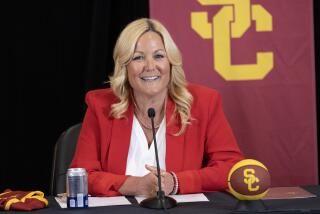His Work Is Cut Out for Him : Finances: McGee, executive director of county sports association, must revitalize and market in an area perceived as apathetic.
IRVINE — Other jobs are available for the Jerry McGees of the world. And easier ones too.
Such observations seem especially appropriate as McGee, hired to lead the troubled Orange County Sports Assn. out of a financial morass, explains what he has gotten himself into.
McGee doesn’t have much to do except redirect, reorganize and revitalize an organization symbolic of the perceived sports apathy in Orange County. The organization’s signature event--the Freedom Bowl--is in jeopardy of being discontinued. And a Hall of Fame set up to showcase the county’s past achievers has been closed to the public, a victim of the group’s money troubles.
The turnaround must occur quickly and resoundingly, which just about completes the position’s appeal.
Of course, McGee jumped in after doing his homework. He knew what lay ahead and was still eager, leaving a position with fewer potential mine-fields. Curious though it might be, McGee likes his surroundings--and chances.
“I certainly was made aware that the organization was in significant financial distress when I came on board,” McGee said. “At times, I am a tad bit overwhelmed. But I feel I’ve been fairly well prepared.”
Which is good for McGee, because the task won’t allow for much catching up. He was named executive director in May, succeeding Don Andersen. McGee is a vice president of the Irvine-based Lindquist Group, which took over management of the sports association in April.
The youngest son of former USC and current South Carolina Athletic Director Mike McGee, he joined the Lindquist Group only a few weeks before his OCSA appointment. He worked the last three years in strategic planning for the Walt Disney Corp., by all accounts a pretty stable situation.
“Jerry was a rising star with us,” said Mark Spears, director of finance and administration, marketing and sales division at Disneyland. “Our loss was the Lindquist Group’s gain.”
McGee’s move didn’t occur by chance. Jack Lindquist, former president of Disneyland and head of the group, had known of and admired McGee’s work. When Lindquist needed a point man for the OCSA, McGee’s name immediately came to mind.
“He’s a very bright young man,” Lindquist said. “He has a good family background in athletics that, while not critical, will be help in what we want to accomplish.
“He’s taken over an organization that had some real serious problems, and I think he’s making progress. He’s a young man with a lot of common sense.”
McGee is 24. Not everyone in the sports association is pleased that someone so young is charged with an undertaking so seemingly unwieldy.
McGee, however, takes a different view. The challenge of rebuilding the OCSA is not a burden but, a rare opportunity.
“I think my age is seen as a liability to some and probably to most,” McGee said. “I try to emphasize that I would like to be gauged by my work as opposed to how many years I’ve been here. Though I may not have many years in experience, I have a strong foundation. I’m confident in my abilities to move this organization forward.”
Doing so hinges on finding ways to reduce the association’s debt--which McGee said is between $1.4 million and $1.7 million--while enabling it to remain a viable supporter and promoter of sporting events. Oh, and the organization also must grow to survive.
“We’ve spent a significant amount of time really developing a financial strategy to make whole all of our past debts,” McGee said. “We feel an obligation that we are not going to leave any of those debts unresolved.
“In some cases it’s a payment plan that may occur over an amount of time, in other cases we may be able to settle up front. But for the organization to grow in the future, we are going to need some leniency from some of these people and some patience from all.”
Naturally, McGee was given time to ease into the job. All he had to do first was decide what to do about the Freedom Bowl, an 11-year money and morale drainer for the OCSA.
The postseason football game has been plagued by extremely poor attendance. Only twice has it attracted crowds of more than 50,000 at Anaheim Stadium, which can accommodate about 69,000 for football. In 1994, 27,477 attended the game between Utah and Arizona. It was the smallest crowd since the inaugural game.
Attendance might not be a problem this year because there might not be a game. Despite several weeks of negotiations with potential title sponsors, the OCSA is no closer to a commitment for the game it would like to be played during the week of Dec. 26-31.
Negotiations with ESPN and Raycom to televise a game have been fruitful, McGee said, but the OCSA will not commit to the event this year without a title sponsor. Ideally, the organization wants a sponsor to make a three-year commitment. But McGee would settle for a one-year agreement with an option for another.
McGee said the NCAA has been cooperative and patient while the OCSA tries to put the pieces together, but the NCAA Bowl Committee needs to know soon if the game--the name would be changed to the Big Orange Classic--will be played in order to start the certification process.
McGee is scheduled to speak with NCAA Assistant Executive Director David Cawood the week of July 10. An announcement about the game’s future should be made by the end of July.
“It’s still up in the air,” McGee said. “Until we get that signature on the contract [for a title sponsor], it’s not something we’re ready to commit to. The Freedom Bowl has a tainted history of losing money and we cannot afford to do that anymore.”
The prospect of interrupting the OCSA’s signature event, even for one season, does not please McGee. However, he said some difficult and potentially unpopular decisions are needed now.
“To be real honest about it, our timing is a couple of months shorter than we would like to have,” he said. “We are not only backed up against some deadlines by the NCAA, but also with regard to fiscal years for most corporations we’re going after for title sponsorship.
“As much as it would be a good thing for the OCSA to have a game in ‘95, it certainly won’t be the end of the OCSA if we don’t. We need to embark on a new direction for the OCSA, and a key aspect of that is being financially responsible. Where we have faltered in the past is possibly making commitments prior to having all the pieces of the puzzle in place.”
This comes on the heels of the demise of the preseason Disneyland Pigskin Classic, whose 1994 game ended a lackluster five-year run. Disney that year dropped its sponsorship of the game, which never drew more than 49,309.
The Orange County Hall of Fame at Anaheim Stadium is another victim of the organization’s money problems. It has been closed to the public since April, but McGee said there are plans to reopen it as well have an induction ceremony for this year’s class. These will be the primary topics of discussion when the group’s executive board convenes July 10, McGee said. The organization also is involved in talks with a company to take control of the hall of fame.
McGee speaks carefully when discussing the organization’s past management. He is even more cautious not to portray himself as some sort of “boy wonder” who will correct the problems single-handedly.
“There are a million people who can Monday-morning quarterback and say, ‘I would have done things differently,’ ” McGee said. “I was not in the organization at the time, but I’m sure [past management] made the decisions they thought were best for the Orange County Sports Assn.
“We’re now making decisions that we think are in the best interest. There are going to be some disappointments but, through a lot of hard work and persistence by certainly not only myself but the board members and everyone, we feel we’ll make progress.”
More to Read
Go beyond the scoreboard
Get the latest on L.A.'s teams in the daily Sports Report newsletter.
You may occasionally receive promotional content from the Los Angeles Times.










